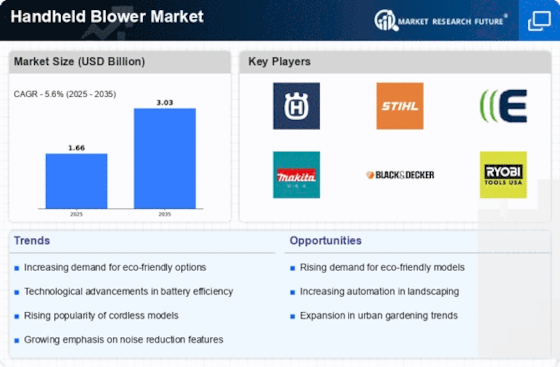Top Industry Leaders in the Handheld Blower Market

*Disclaimer: List of key companies in no particular order
Top listed global companies in the industry are:
- RedMax
- Ryobi
- Makita
- ECHO
- Worx
- Toro
- Sun joe
- EGO
- Shindaiwa Canada
- STIHL
- Black+DECKER, among others
Blowing Up the Competition: Navigating the Handheld Blower Market
The global handheld blower market is a whirlwind of activity where established players battle for leaf-clearing dominance. Understanding the strategies driving this competition, the factors influencing market share, and emerging trends is crucial for navigating this dynamic landscape.
Key Players and their Strategies:
- Global Giants: Goliaths like RedMax and Stihl leverage their extensive product portfolios, brand recognition, and established distribution networks to maintain a significant market share. RedMax offers diverse blowers for professionals and homeowners, while Stihl excels in high-performance gasoline-powered models.
- Regional Champions: Companies like Makita and Echo dominate specific geographies by tailoring solutions to regional preferences and price points. Makita caters to Japan's demand for cordless options, while Echo excels in cost-effective gasoline blowers for North America.
- Innovative Upstarts: Startups like EGO Power Systems and Greenworks Tools are disrupting the market with cutting-edge approaches. EGO focuses on powerful battery-powered blowers with advanced brushless motors, while Greenworks pushes the boundaries of affordability with budget-friendly electric models.
Factors for Market Share Analysis:
- Product Breadth and Depth: Offering a range of blowers with diverse power sources (electric, gasoline, battery), airflows, and functionalities caters to varied customer needs and expands market reach.
- Technological Innovation: Integrating brushless motors, variable speed control, and noise reduction features enhances performance, user comfort, and environmental impact. EGO's brushless motor technology exemplifies this.
- Cost-Effectiveness and ROI: Balancing advanced features with affordability is crucial, especially in price-sensitive segments. Greenworks' cost-effective blowers have secured a strong foothold in emerging markets.
- Sustainability Focus: Reducing emissions and noise pollution through electric and battery-powered blowers is gaining traction. EGO's commitment to battery technology exemplifies this trend.
Emerging Trends and Company Strategies:
- Battery Technology Advancements: Increasing battery capacities, faster charging times, and longer lifespans are driving the adoption of cordless blowers, particularly for professional use. Greenworks' extended-life batteries cater to this growing demand.
- Focus on Ergonomics and User Experience: Lightweight designs, comfortable grips, and low vibration contribute to user comfort and extended use times. Makita's ergonomically designed blowers exemplify this approach.
- Smart Features and Connectivity: Integrating Bluetooth connectivity, app control, and real-time performance monitoring capabilities is gaining traction. EGO's Connect platform exemplifies this trend.
- Specialization and Niche Markets: Catering to specific segments like backpack blowers for professionals or lightweight blowers for homeowners is a growing trend. Stihl's professional backpack blowers illustrate this approach.
Overall Competitive Scenario:
The handheld blower market presents a dynamic landscape where global giants face challenges from regional players and innovative startups. Success hinges on offering diverse product portfolios, embracing technological advancements in battery technology and user experience, catering to specific market segments, and prioritizing sustainability. Companies demonstrating agility, cost-effectiveness, and a commitment to user-friendly and environmentally responsible solutions hold a strong hand in navigating this competitive market.
Latest Company Updates:
May 2023- Makita is adding to its seemingly endless array of battery-powered tools with a handheld blower that can clear dust and inflate air-filled items such as inner tubes or footballs. The DAS180LXT Brushless Blower runs off the firm's established 18V lithium-ion battery system and delivers a variable blast of air when the trigger is pulled. For extended use, there is also the option to lock in the on position to give continuous running. Users can select between four air volume settings, with the maximum delivering a blowing force of 2.8N, an air speed of 200m/s, and a volume of 1.1cu m/min. Various nozzles are available with narrow, wide, and fan-shaped openings to suit different tasks, from blowing out filters to clearing dust from boltholes and awkward corners. There's even a flexible nose for accessing particularly awkward spots. And attaching a hose to the rear of the tool activates a suction function so that it can be used to deflate air-filled items. Continuous run time with a 6Ah battery is about 55 minutes on low power and 21 minutes on high, and there is a washable filter to keep it running at peak performance. The bare tool (no batteries or charger) can be picked up online for about £135.
October 2023- Whisper Aero emerged from stealth a little over two years ago with a straightforward (if ambitious) plan: to radically reduce noise emissions from next-gen aircraft with a never-been-done-before electric thruster. But according to Whisper COO Ian Villa, from the very beginning, the company was thinking more expansively. The startup was founded by Villa and CEO Mark Moore, both former executives at Uber's aerial ridesharing project Elevate. Early on, the two founders had a hunch that the electric propulsor could be scaled down for products outside the aviation industry.










